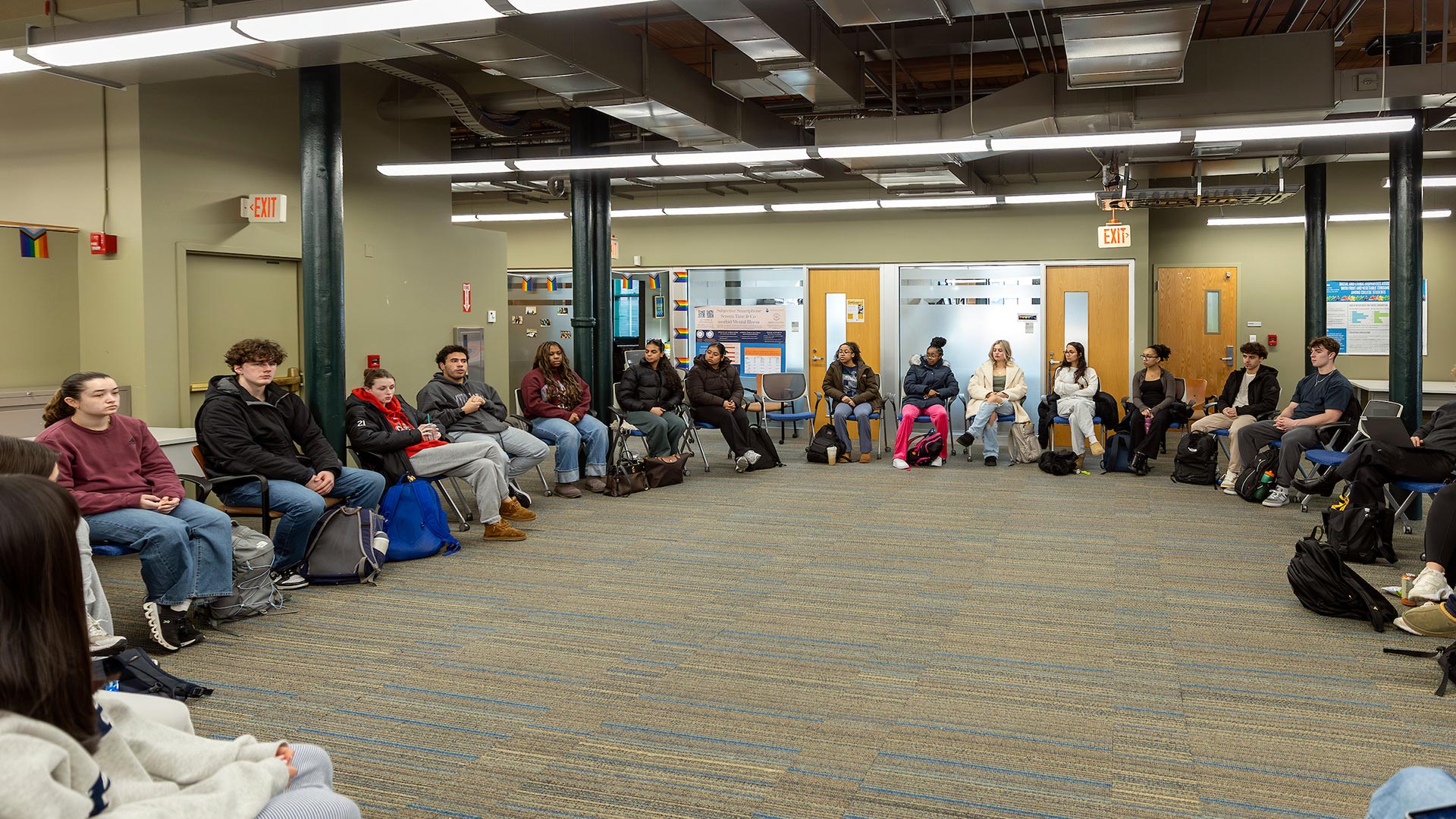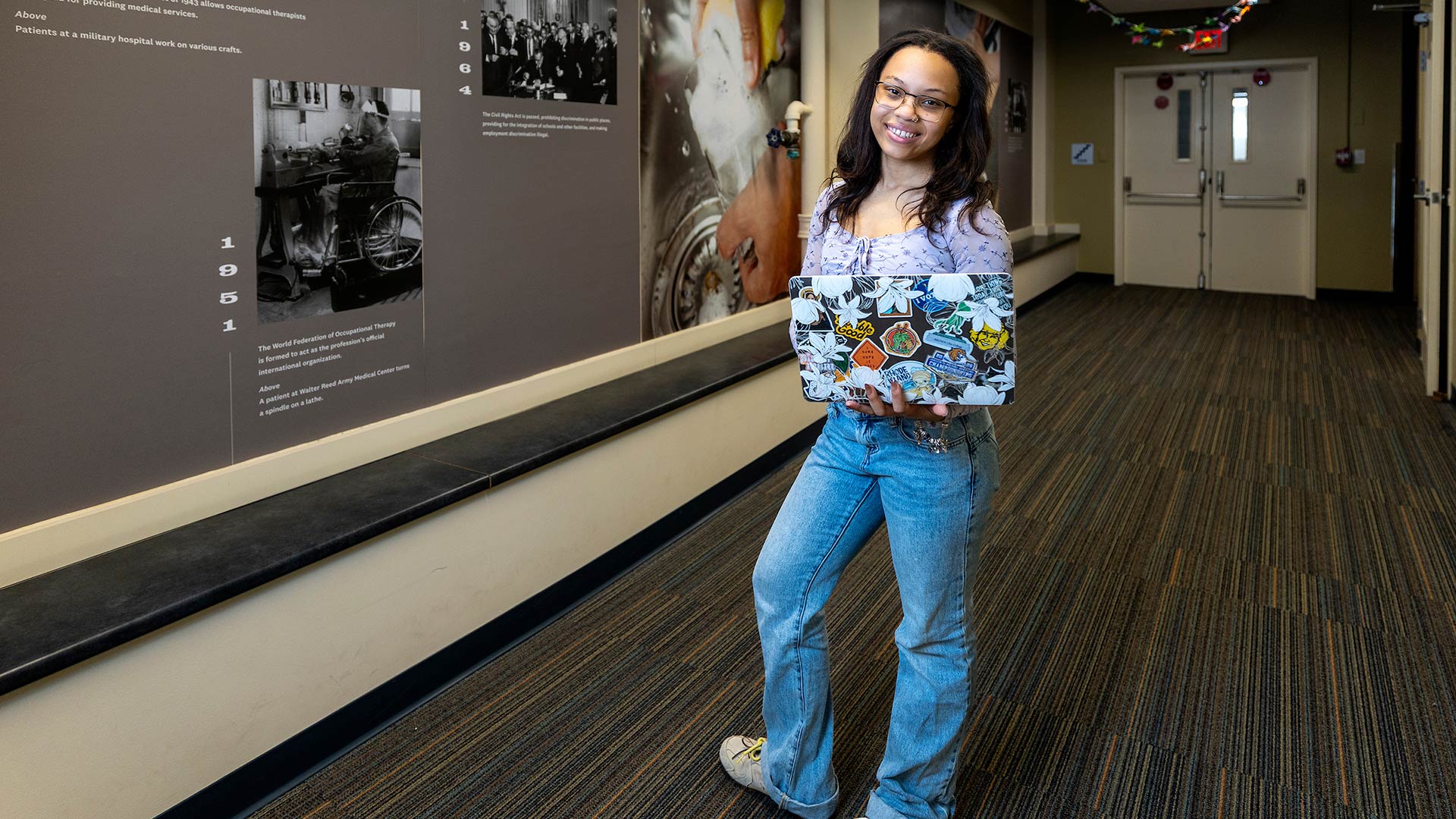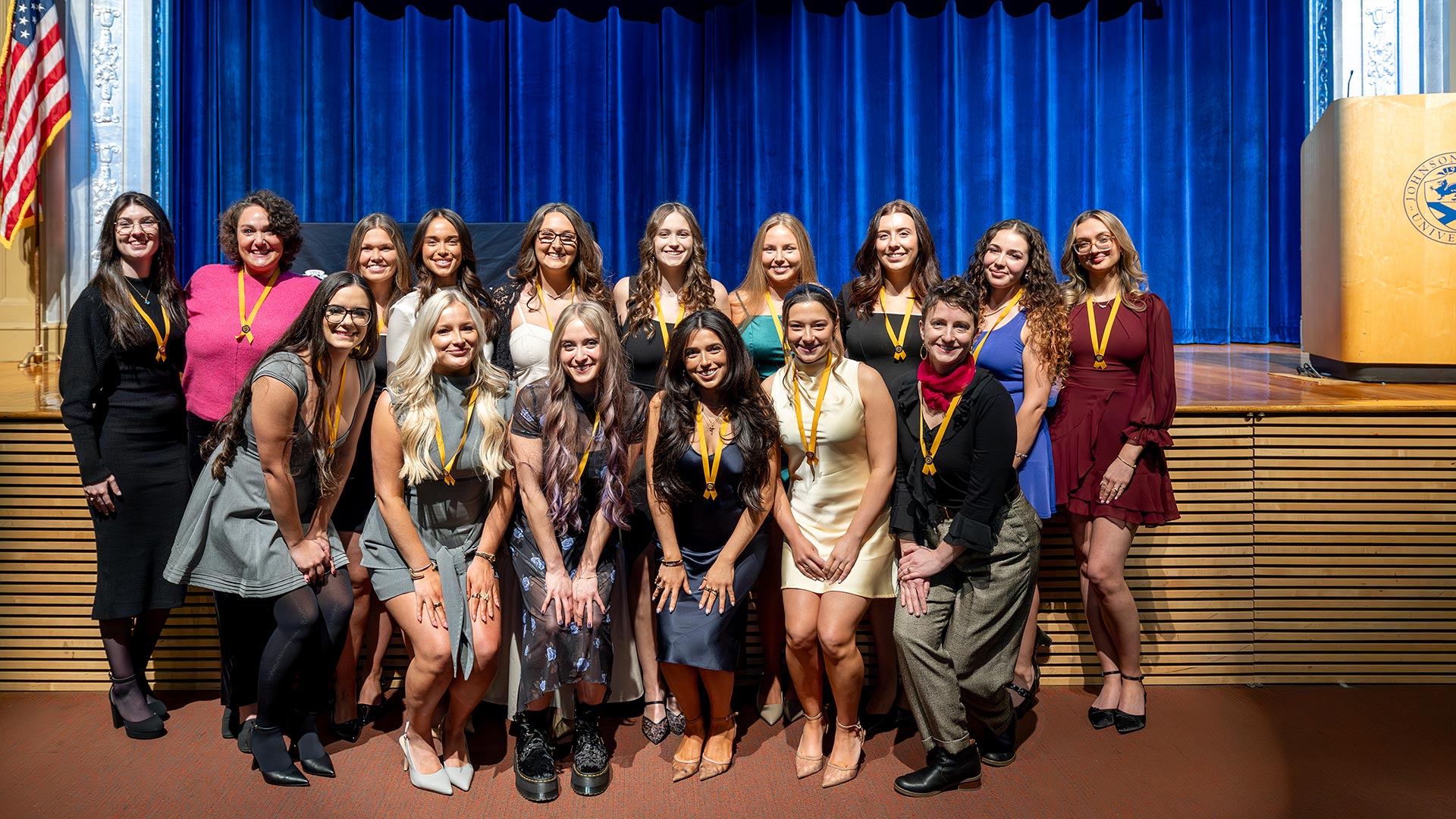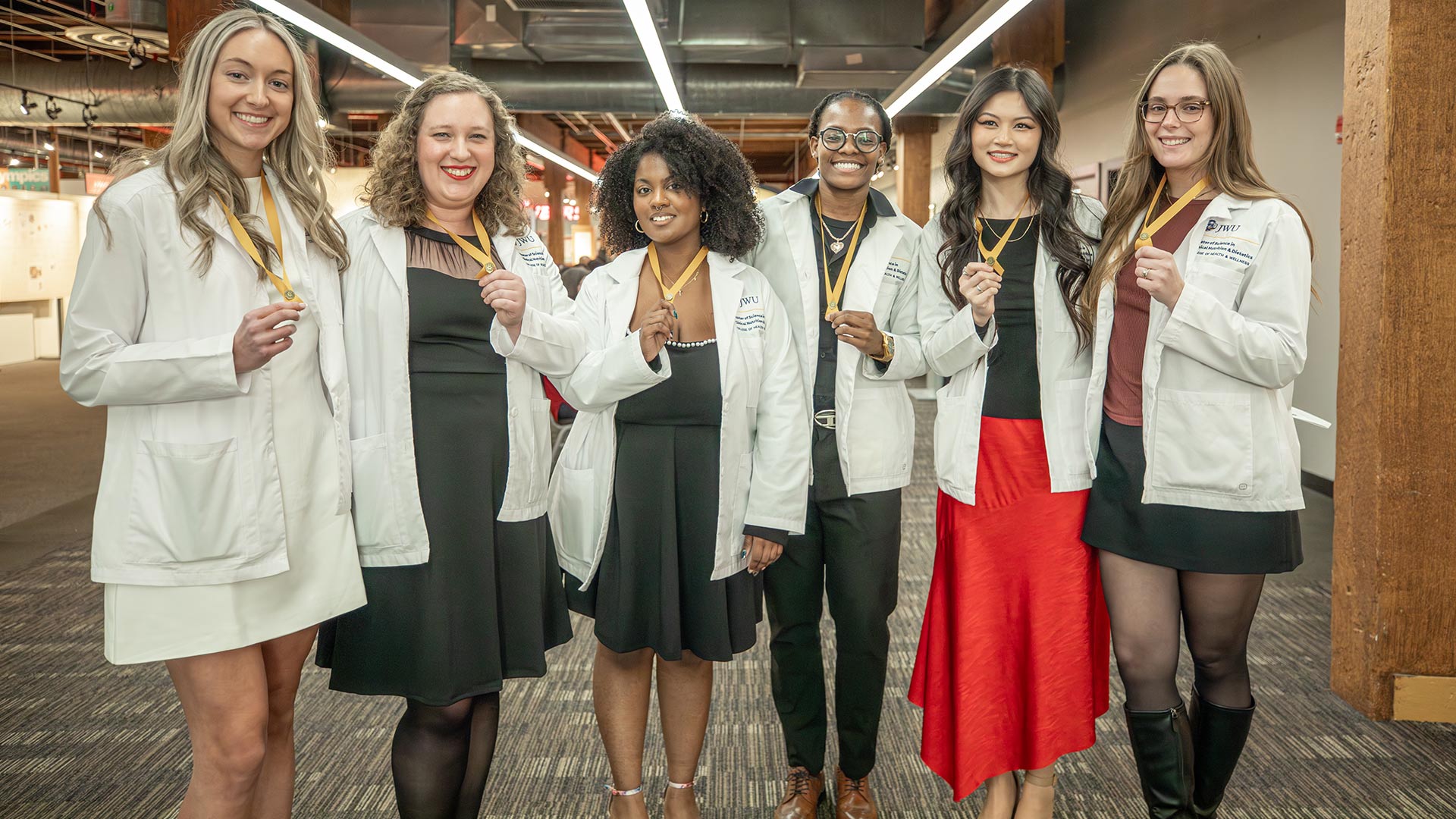Physician Assistant Program Shines with National Student Awards
While Johnson & Wales University’s Center for Physician Assistant Studies has been recognized for being one of the country’s few facilities dedicated entirely to the education of physician assistants, two of its M.S. in Physician Assistant Studies students are stealing the spotlight. Meet Jessica Ruggiero and Emily Villalta, recipients of a prestigious fellowship and competitive scholarship, who are both already on paths to serve patients with dignity.
Jessica Ruggiero ’26 MSPAS
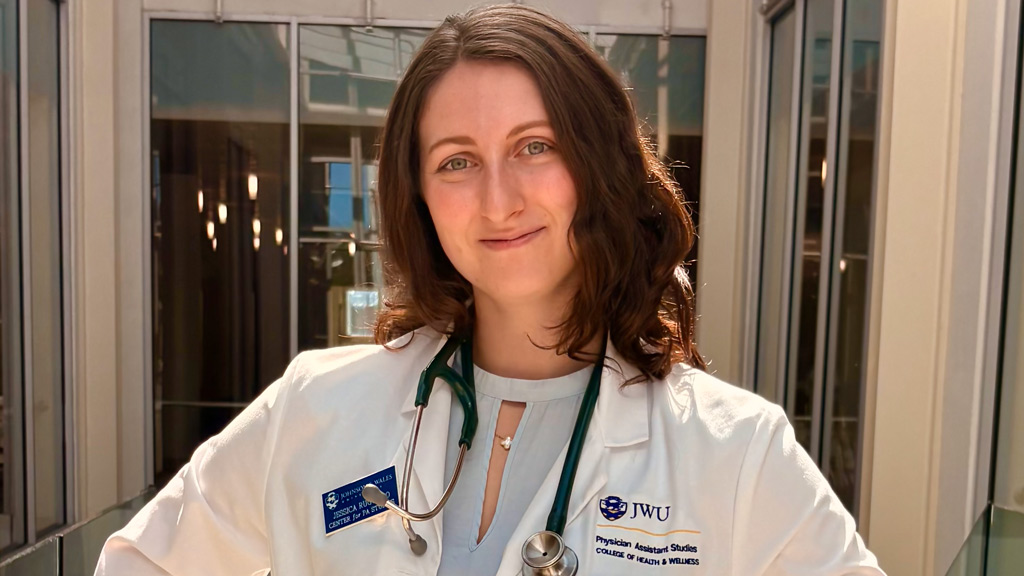
Ruggiero is a 2025-2026 Physician Assistant Education Association (PAEA) Student Health Policy Fellowship awardee, meaning that she’s been specially selected among 18 PA students across the U.S. who represent the next generation of policy-minded professionals to participate in a program. In the fellowship, she’ll develop leadership skills and better understand the political process so she can advocate for healthcare for others.
How Ruggiero Found Her Way to a PAEA Fellowship
“I first heard about it through an announcement from my program director, Thomas Meehan,” Ruggiero states. “As class vice president, I immediately felt inspired to apply, as it seemed like the perfect opportunity to learn more about advocacy and what it means to use your voice for your profession and your patients. The selection process was competitive, with only about 15-20 students chosen nationwide — so when I found out I had been selected, I felt deeply honored and grateful to represent JWU and my classmates.”
The fellowship has included some notable perks. “One of my favorite experiences so far has been participating in ‘Hill Day,’ where I spoke with staffers from Senators Whitehouse and Reed, as well as Representative Magaziner, to advocate for Title VII programs that strengthen and diversify the healthcare workforce,” shares Ruggiero. “I am now designing a project proposal for a potential congressional site visit at JWU’s PA program so policymakers can see firsthand the rigor of PA education and the dedication behind it. It’s been an incredible reminder that advocacy and clinical care go hand in hand.”
Why Ruggiero Chose JWU’s Physician Assistant Studies Program
“I was drawn to JWU because of its reputation for shaping both competent and compassionate providers who approach medicine holistically,” states Ruggiero, who had earned her B.S. in Psychology at a Massachusetts university, concentrating in neuroscience with a minor in biology. “I really admired how the program integrates lifestyle medicine and nutrition into its curriculum, being known for its culinary education and innovation. As part of our Food is Medicine course run by Professor Sullivan, we learned directly from registered dietitians and professional chefs. We participated in culinary labs where we prepared meals based on evidence-based diets such as the Mediterranean, DASH, and whole-food, plant-based meals. It showed me that JWU values treating the whole person, not just the condition.”
Her path to JWU wasn’t a straight line; during her undergraduate years, Ruggiero worked as an EMT, served as a research assistant in a sleep lab and volunteered as a COVID specimen collector to support her community. After graduation, she worked as a medical assistant at Brigham and Women’s in an outpatient orthopedics clinic. “I initially planned for medical school and even took the MCAT, but I ultimately felt the PA profession was a better fit,” she notes. “I loved how PAs emphasize teamwork, adaptability and direct patient care.”
She credits having worked as a senior mental health counselor for about two years for deepening her understanding of behavioral health and its impact on every area of medicine. “Overall, each of these experiences led me to JWU, where I have been able to grow into the kind of provider I have always hoped to become,” she concludes.
What Ruggiero’s JWU PA Experience Has Been Like
“PA school has been one of the most challenging and rewarding experiences of my life,” she states. “It’s an intense, accelerated program that pushes you academically and personally, but it also teaches resilience, teamwork and humility. For example, our anatomy course condenses a year-long medical curriculum into just 10 weeks. It’s demanding, but the level of support and quality of teaching has been phenomenal.”
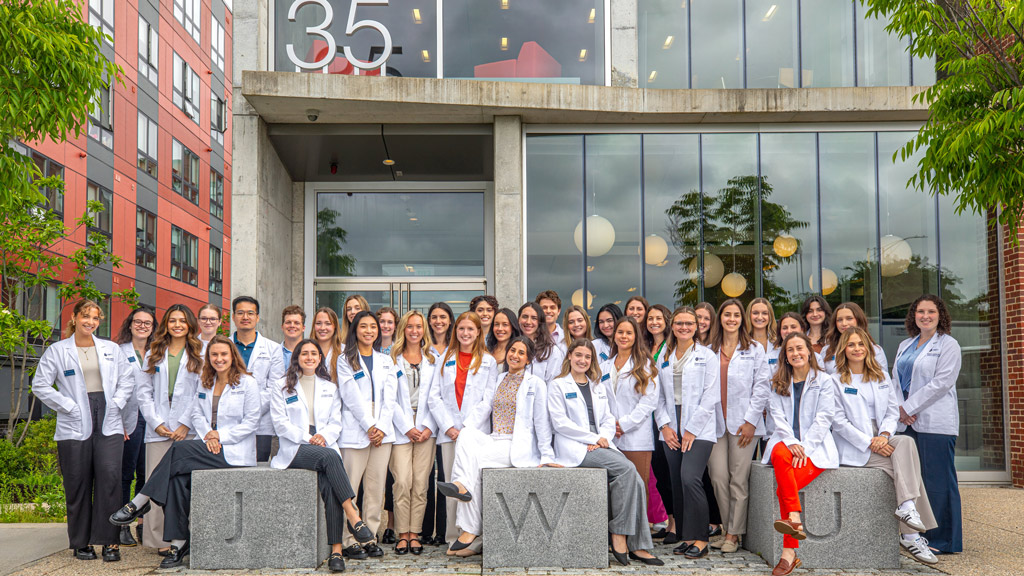
PA education is divided into two parts — didactic learning followed by a clinical year spent training across core specialties of medicine — and Ruggiero finds that each has its own unique challenges. “During the didactic year, we’re in lectures Monday through Friday from 8 a.m. to 5 p.m., learning about countless diseases and disorders: their pathophysiology, risk factors, signs and symptoms, diagnostic testing, and treatment options, whether lifestyle-based or pharmacologic. Most days end with pharmacology lectures diving deep into mechanisms of action, side effects, and interactions across hundreds of drugs. It’s a lot, but it’s also incredible how much you can grow in such a short time.”
This year, Ruggiero is putting those lectures into practice. “Clinical year feels like revisiting all of that information, but now with real patients. Seeing those concepts come to life in practice has reaffirmed everything I learned just a year prior and truly the best part of PA school. To every PA student out there I applaud you. The amount of dedication, sacrifice and perseverance it takes to complete this program is no small feat. It demands so much of you, but it’s also one of the most fulfilling journeys you can take.”
How Ruggiero Applies JWU PA Program Skills to Patient Care
“The skills I have learned at JWU come to life every day on rotations. The biggest one has been history-taking and a physical exam,” says Ruggiero. “Professors Robertson and Muller made sure we understood how to listen deeply, examine thoroughly and think critically. Those lessons have shaped how I approach every patient encounter, and I am still perfecting that.”
“Clinically, I have been able to perform procedures like intubations and laceration repairs in the emergency department, thanks to the training we received from Professor Baillie,” she continues. “I interpret lab results and imaging, and I educate patients daily on lifestyle changes and medications that can dramatically improve their quality of life.”
Adds Ruggiero, “My background in mental health has also been invaluable as it helps me connect with patients, recognize emotional factors influencing their health and provide care that feels both human and healing. I am truly thankful to the JWU faculty for preparing us so well to care for people with competence and compassion.”
What's Next for Ruggiero
Ruggiero is still exploring what her future will look like: “I have a few more rotations left, and each one has opened my eyes to new possibilities. I plan to apply to the U.S. Navy next year, as serving those who serve our country has always been a personal goal of mine. My father’s military service inspired that path, and I would be honored to continue it in my own way.”
In the meantime, she notes, “I have really enjoyed emergency medicine for its intensity and teamwork, but I also have a strong appreciation for primary care and preventive medicine. Ultimately, wherever my career takes me, I hope to keep combining clinical care with advocacy — especially for anyone who feels unseen in the healthcare system. I just want to serve others with empathy, skill and heart that improve their quality of life. No matter what I do, I will be proud to call myself a physician assistant.”
Emily Villalta ’27 MSPAS
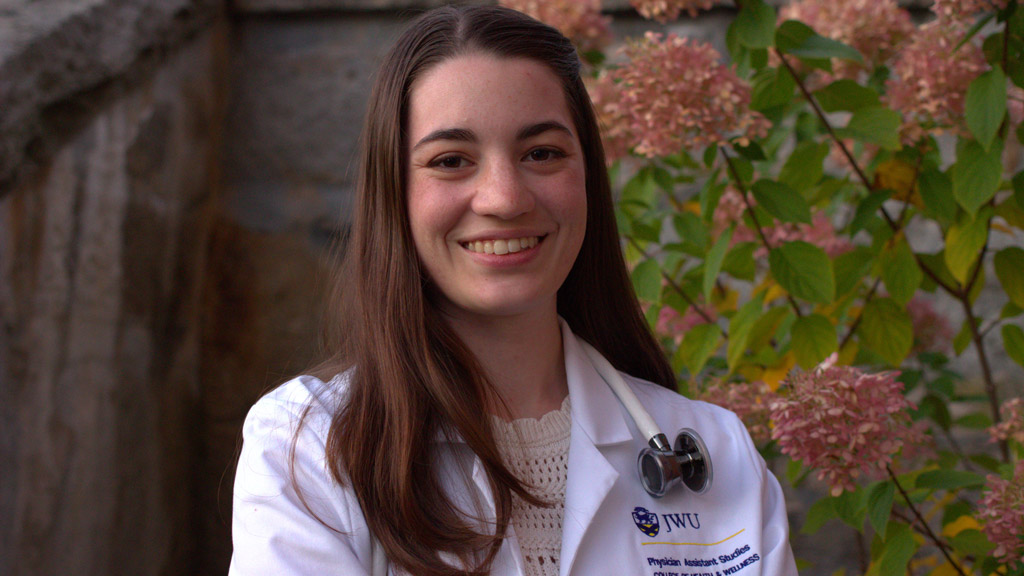
Villalta was awarded the National Health Service Corps Scholarship, which funds her MSPAS degree and provides a stipend in exchange for committing to working in an approved Health Professional Shortage Area for at least two years after graduation. States Villalta, “The National Health Service Corps Scholarship is an amazing opportunity for those who have a heart for the underserved areas of our country.”
How Villalta Found Her Way to a Service Corps Scholarship
“My husband was researching VA scholarships because I was working for the VA at the time,” she explains. “The scholarship fully covers tuition in exchange for a number of years of service in a designated Health Professional Shortage Area (HPSA). I will have to work a minimum of two years in exchange for them covering two years of school.”
She found the scholarship application to be less work than applying to PA school, but it was competitive nonetheless. “They estimated about 3,000 applicants for 200-250 awards, so I didn’t expect anything at all,” she reveals. “When we found out I had received the award, my husband and I felt beyond blessed! There may have been some jumping and screaming involved.”
Villalta knows more than most about healthcare provider deserts. “I grew up overseas throughout different countries in Southeast Asia. In one of the places we lived, you actually had to fly to a different country to receive any kind of significant medical care (giving birth, any surgery or emergency, etc.),” she explains. “We were there with an organization that was able to allow us to do that, but the people from that country usually didn’t have the means to travel so far. This scholarship opened the doors to have the financial freedom to serve the underserved and maybe one day go overseas with my family and provide medical care that is severely lacking.”
Why Villalta Chose JWU’s PA program
In 2023, Villalta earned her B.S. in Biology from a liberal arts college in Massachusetts. “By that time I had known for years that I wanted to be a PA,” she shares. “I started researching PA schools around sophomore year of undergrad. I wanted to stay local to New England, which is initially how Johnson & Wales came onto my radar. When I told my grandmother who lives close by, she was so confused because she thought it was a cooking school — we had a good laugh over that one. I didn’t realize until I did some more research that cooking would actually be a part of my medical education there as well! The Food Is Medicine course was a very unique draw to JWU and immediately put it on the top of my list.”
Villalta needed to prepare by earning the minimum amount of patient care hours and ensuring she had the right requirements to apply. “I worked as a CNA in several different nursing homes throughout college as well as a medical assistant in a float pool for Winchester Hospital’s outpatient specialty clinics — rotating through Weight Management, Urology, Women’s Health, Primary Care, and several others. I continued that work up until I got married in July 2024 at which point I transitioned to working at the VA in Bedford in their Podiatric Clinic. I loved the variety of experiences I got, and I think it prepared me well for PA school.”
Amid both working and planning her wedding, Villalta completed her PA school applications. “Once the applications are submitted it is agony waiting to hopefully hear back from at least one school. This is what made every interaction with JWU’s PA program all the better. I truly felt that empathy and humanism they talked of in their mission statement in every interaction with the program. In a world of online interviews and zoom calls, JWU invited me to their campus, and I left already knowing the faces of future professors and classmates. Holding in-person interviews is just a small example of the personality of JWU’s PA program. I knew I could trust them to shape me into the patient-centered, empathetic, humanistic provider I wanted to be.”
What Villalta’s JWU PA Experience Has Been Like
“Amazing!” she exclaims. “JWU’s PA mission statement is really the life-blood of the program. I have not only learned more than I thought possible in such a short amount of time but also been able to see more clearly what it takes to be a humanistic provider.”
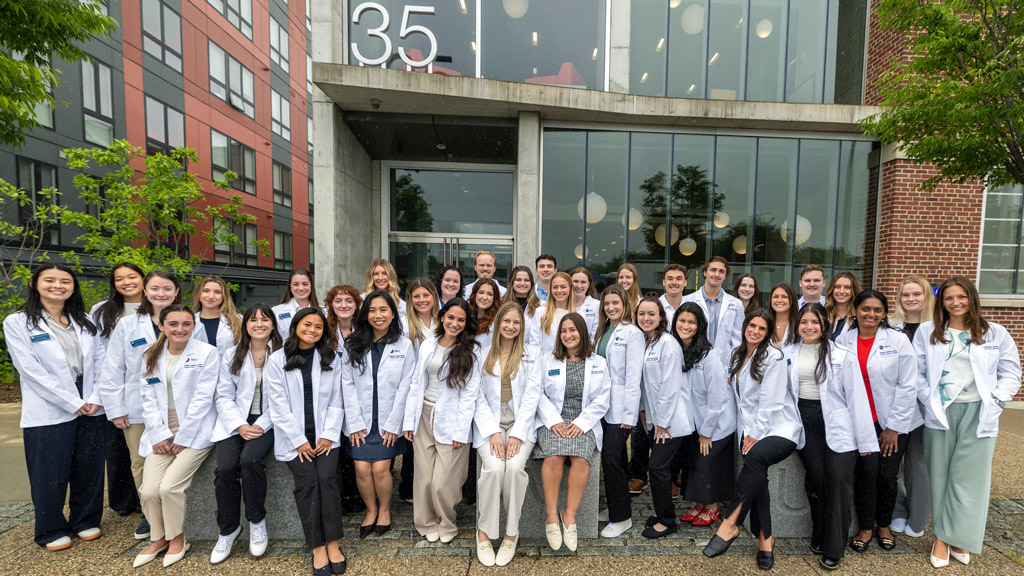
An example: “We all had to write our own personal mission statements during our first semester to have something to hold on to that will keep us going in this tough education and career. My faith is Jesus is what keeps me going and He provides me with the strength and wisdom to persevere and the humility to learn from everyone around me. Additionally, proper draping techniques to maintain patient dignity, practice in having difficult or culturally sensitive conversations, skills in motivational interviewing, and awareness of different presentations of diseases among different populations — these threads are woven throughout every class we take. I can’t wait to be a PA!”
Villalta is still in the didactic PA learning phase, learning much from dissecting cadavers and from working with “patients” for observed structured clinical evaluations (OSCEs). But looks forward to her future clinical rotations, saying, “Being able to practice in such a safe constructive environment has given me a lot of confidence in future patient interactions.”
What Villalta Envisions After Graduation
The future physician assistant has more than one dream for what her future holds. “One of them is to serve in a rural/health shortage area — maybe working with immigrant or refugee populations, because I grew up always going to doctors who didn’t speak my language and in a place I wasn’t familiar with, so I would love to meet people in that place as well,” she states.
“I am also very interested in women’s health and would love to walk with different women through all the changes our bodies go through," Villalta adds. “Or I would love to work with the geriatric population, maybe doing home health primary care or nursing home primary care. That last one I am the most passionate about. My mom has always called me an old soul, and the first time I stepped into a nursing home they had my heart. Life doesn’t last forever, and I would love to help people end strong.”
PA Program Director Congratulates Ruggiero and Villalta
“Jessica has been involved in advocacy in the state of Rhode Island and it is well deserved for her to receive such a national honor," states Thomas Meehan, program director for JWU's Center for Physician Assistant Studies. “We are very proud of her dedication.”
“Emily becomes the fifth National Health Service Corps Scholar from our PA program," Meehan informs. “This honor indicates her dedication to primary care, which is so greatly needed. She will serve her patients well, and the program is proud of this accomplishment.”
